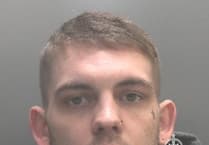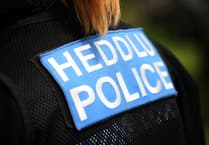“When I see a police car, I now assume that I’m going to get stopped — absolutely.”
These are the words of a respected doctor from Aberystwyth, who is the latest to allege racial targeting from police after being stopped in Ceredigion five times in the last 12 months.
The reality is if you’re black, you’re more than eight times as likely to be stopped and searched than anyone else in the Dyfed-Powys Police force area.
If you’re black and live in the region covered by North Wales Police, that figure falls to three times as likely.
And statistics show the darker your skin, the more likely you are to be stopped.
The figures come as human rights organisation Liberty calls on the UK Government to tackle the ‘appalling injustice’ of increased stop and search rates for people of colour.
The controversial practice involves police stopping individuals they suspect may be carrying weapons, drugs or other contraband.
While there are rules that govern how searches are carried out, several organisations have said they want the practice banned or heavily rolled back - in part because it is used far more often on people of colour, particularly those in black communities.
The latest Home Office figures shows that of 4,191 searches carried out by North Wales Police in the year to March 2022, 26 were of black people – equivalent to 17.4 for every 1,000 black people in the area, according to the latest population data.
By comparison, there were 3,980 searches of white people – or 5.9 for every 1,000 people.
The same figures show that of 2,669 times the practice was utilised by Dyfed-Powys Police in the year to March, 33 were of black people – or 38.6 for every 1,000 in the area.
There were only 2,374 searches of white people – or 4.7 for every 1,000.
This means black people are 8.2 times more likely to be subjected to the practice by Dyfed-Powys Police, compared to only 2.9 times in North Wales.
The difference between black and white is putting pressure on Dyfed-Powys Police to change its practices after the Cambrian News heard from several people of colour who claim they are repeatedly being pulled over by officers.
The healthcare professional from Aberystwyth, who does not want to be named, was inspired to speak out about his experiences because he fears there is a developing ‘pattern’ in stop and search practices in the force area.
The 35-year-old of south Asian origin grew up in the town but says the only police contact he’s had has been in the last year or so.
In February, the community rallied around much-loved businessman and military veteran Phil Powell who described the trauma of allegedly being ‘assaulted’ and ‘constantly’ pulled over by police in Ceredigion. A racism row was sparked after Mr Powell, the owner of Mama Fay’s Caribbean restaurant in Aberystwyth, alleged he’d been stopped more than 40 times in 10 years.

The doctor, who had heard about Phil’s experiences, told the Cambrian News while sitting in his office that he has ‘thick skin’, but being targeted for stop and search makes him feel ‘vulnerable’ and like he is having a ‘finger pointed’ at him.
He has a clean driving license and has no record of criminality.
But he fears for younger people and students who are yet to go through the ‘trauma’ of being targeted.
“My encounters with the police haven’t been pleasant,” he said. “I’ve been stopped five times in the past 12 to 14 months.
“I’d say it’s a lot of times to be pulled over in a small place like this.
“I was driving past the skate park on the main road (A487), and I saw a policeman coming towards me and he immediately spun around by the roundabout and followed me for a bit.
“And then the lights went on. I was dressed in joggers and had a woolly hat on. He came up and he asked me whether the car that I was driving was mine.
“Then he asked me whether I’d ever been in trouble with the law – which was very strange. I’ve got friends who are police officers and they agreed it was a weird question ask someone like me.
“I asked him if there was any reason that he’d asked that – because I’ve never been in trouble with the law.
“Then he said his system was showing that I didn’t have any insurance which I thought was surprising because I knew I had insurance.
“I logged in to the insurance portal and showed him I was insured. He looked at it and then told me he was going to have to call and check.
“He asked me to show him that I was insured, and I showed him. But clearly, he didn’t believe me.
“He kept me there for ages. It was 11 o’ clock at night and I was freezing.”
The Aberystwyth resident of nearly three decades said he was ‘very concerned’ to hear about Mr Powell’s story and he joined him in calling on improved vetting procedures, better racial bias training for all officers and more diversity in the force.
He said he is not surprised that people are reluctant to speak on record about their experiences for fear of judgement and suspicion. The Cambrian News has been in contact with six individuals including a few business owners who say they’re regularly bothered by the police for no reason. But they opted not to speak out.
The doctor said he’d been victim of racism only twice while living in the area and never from someone in a position of authority.
“I’m kind of naïve when it comes to that because I sort of blended into this culture from a young age,” he said.
“I’ve never been too aware of any problem, and I’ve got thick skin.
“But it’s the officer’s accusatory questions. I would never dream of breaking the law.
“I’m from a very conservative south Asian background – my parents would kick my ass if I broke the law... and I’m 35!
“It makes me think, ‘has someone used my number plate to do a bank robbery?’ Or something.
“Am I in danger? Am I being targeted? I know I haven’t done anything wrong.”
He said he applied to join Dyfed-Powys Police when he was younger and was tapped up by the force due to the lack of officers from minority ethnic backgrounds.
He called on the force to be open and transparent with the public about current practices and what action it will take to reduce racial targeting for stop and search.
“It’s interesting because it hasn’t really changed much,” he said. “The force doesn’t have a lot of officers from minority backgrounds.
“And there’s a worrying pattern when you look at who is pulled over the most.
“And hearing about some terrible things that have happened in the UK involving police, this sort of thing clearly does add to that fire - and it should make us think about what is going.
“Are ethics and morals in the right place? Is there adequate training? Is there a decent vetting process? These are the questions.”
In response to his experiences, a Dyfed-Powys Police spokesperson said: “We are unable to review and comment on the specific allegations as no personal details have been provided which we can search on.
“A priority for Dyfed-Powys Police is keeping our communities safe and one operational tool we employ is to stop and search. The power to stop and search members of the community is an important one, but only used where there are reasonable grounds to do so.
“Stop and search is used to prevent crime and identify those who intend to cause harm. There are many restrictions placed on how police use the power of stop and search - these are there as safeguards – to ensure it is used in a fair and effective manner.
“To this end, all searches conducted on those who identify themselves as from our Black, Asian and Asian communities are audited. In addition, we utilise external scrutiny panels to examine how we use this policing power and to identify how we can improve.
“For those who may feel they have been unfairly treated, there is a complaint process they can follow. Any complaints we do receive are taken extremely seriously.
“During the police officer recruitment process all the national assessments undertaken assess the applicant for any form of bias.
“To successfully pass the recruitment process, our applicants are vetted to RV level and during the extensive searches that are undertaken, including social media activity.
“All police officers and police community support officers receive training in equality, diversity and racial bias. The training is regularly reviewed and updated.”
Mr Powell, a 41-year-old father-of-two of Jamaican origin, says he has lost count of how often he is pulled over by Dyfed-Powys Police officers and estimates it has happened more than 40 times in the 10 years he has lived in Aberaeron.
In response to his complaints, a force spokesperson said: “It was found that on each occasion the complainant was stopped by police there was a legitimate and appropriate reason for doing so. In addition, there was no indication that race played any part in the decision to stop him.”
It is unclear what the spokesperson refers to when they say, ‘legitimate and appropriate reasons.’ Mr Powell says he has been penalised for speeding only once – and has no record of any criminality.
Mr Powell has appealed for others to speak out about their negative experiences with police - and has had numerous people stop to thank him for highlighting the issue.
A force spokesperson confirmed this week: “(Mr Powell’s) complaint has been recorded by the Professional Standards Department and enquiries are ongoing.”
In response to the allegations made by Mr Powell - which received national news coverage - a spokesperson for Stand up to Racism Wales told the Cambrian News: “We hear all the time that efforts are being made to challenge discrimination, but words are not enough.
“To be stopped 40 times in 10 years, and never be charged with anything is harassment and racism.
“It is to the shame of Aberystwyth and Wales that this is happening, and we demand that it stops.
“Institutional racism is a clear problem within the police. What is the police commissioner going to do about this?”
Dyfed-Powys Police has been embroiled in several race scandals such as the case of disabled 22-year-old woman Siyanda Mngaza who was jailed for four years in 2020 for Grievous Bodily Harm (GBH) after retaliating to alleged racial abuse from two much older white men and one woman.
The case is being branded by UK race groups as a serious miscarriage of justice.
At the beginning of January, a Welshpool owner of a bakery alleged she has been persistently targeted and harassed by police officers – which has caused her to have panic attacks.
The force denies any wrongdoing on both occasions.
Regional anti-racism campaigner and Aberystwyth resident Rhodri Francis has conducted interviews with victims of racist abuse in the area. This includes a barber who was harassed by anti-terror police and accused of being an ISIS operative.
He also interviewed Dyfed-Powys Police and Crime Commissioner Dafydd Llewelyn about the force’s record on race in 2021.
Mr Llewellyn said the force was focusing on educating officers and improving unconscious bias training. But he did say that stop and search figures released by the ONS were a ‘very crude’ indicator of police performance – as they’re inflated by the lack of diversity in the force area. He said it is right to be cautious about those figures and whether they indicate the force was institutionally racist.
The National Police Chiefs’ Council, a representative body for British police offers, called the practice a ‘valuable policing tool’, but said there was more work to do to address concerns around ethnic disparities.
Amanda Pearson, the organisation’s lead for stop and search, said: “We know that the use of stop and search can have a significant impact on individuals and communities, and particularly on young people.
“We encourage anyone who feels unhappy at how a search was conducted to contact their local force.”
Emmanuelle Andrews, Policy and Campaigns Manager at Liberty, a human rights charity, said: “Stop and search is a traumatic and distressing experience, leaving a lasting impact on both individuals and communities.
“Not only this but stop and search is an ineffective policing tool – with these figures showing that the vast majority of stops result in no further action,” she added.
The Cambrian News once more appeals to anyone who has suffered similar treatment to speak to us – anonymously or not.
It seems even a doctor - someone who cares for others in our community - is not safe from repeated stop and search. Though, of course, no one should be pulled over purely for the colour of their skin.
“We should be trying to stop this sort of discrimination because not everyone who gets stopped is so easy going or thick skinned about it – and they may find it very traumatic,” the doctor added.
“I know there are lots of students who haven’t been here very long who already feel like outsiders and for the authority to stop them and question the validity of whatever they’re doing could be very daunting for them.
“I think light needs to be shone on the issue – otherwise I wouldn’t be doing this.
“Again, I’ve been brought up to respect authority – police, teachers, whatever.
“But now when I drive past the police I think, ‘here we go again’.”




